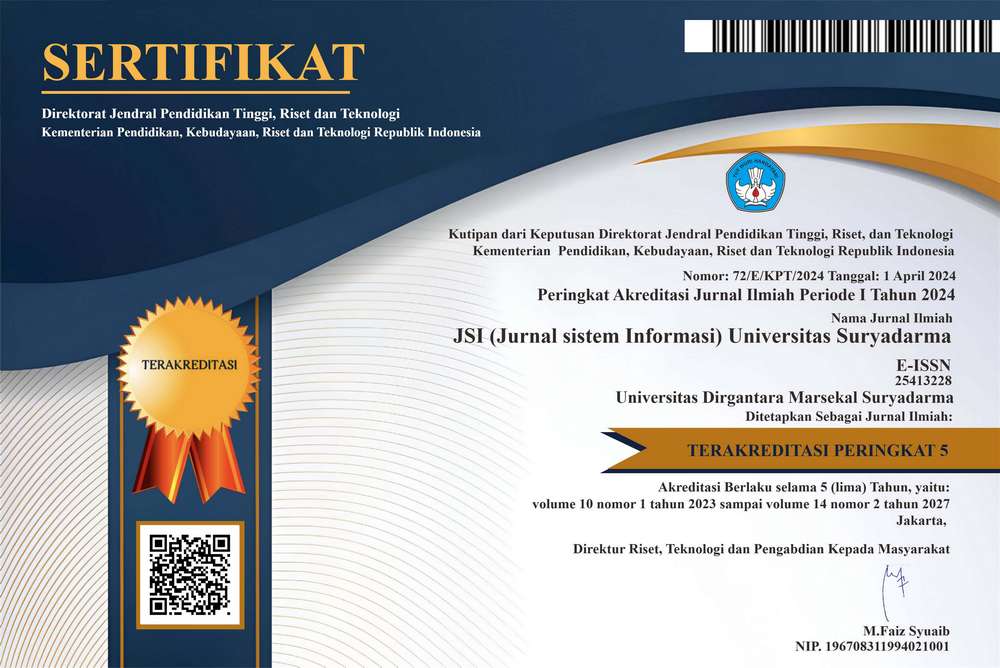PENERAPAN METODE MONTECARLO UNTUK GERAK PENGONTROLAN ROBOT BERBASIS RANDOM WALKS
DOI:
https://doi.org/10.35968/jsi.v8i1.619Abstract
The development of science and technology encourages the development of robots. Robots are widely used in various fields of human life to facilitate human life. Robot making has developed both in terms of methods and algorithms used in robots. The use of the montecarlo method and the random walks algorithm are widely implemented in robot designs at present.    The basic concept of the Montecarlo method in solving differential equations is the probability of a random walk. Based on the approach in the random step process, the Montecarlo method is known for two types of approach that are quite popular, namely the fixed random walk type and the floating random walk type. For this research, the researcher intends to apply the monte carlo method to control the motion of a randon walk based robot. In this research method, the research stages will be described including needs analysis, application of the monte carlo method, making applications to control robots using Arduino.The results of this research, testing using the Montecarlo method, show that the response of the robot is not too slow, the new robot reacts not too far beyond the existing speed change limit. From the above tests, it can be analyzed that the application of the Montecarlo method is more effective and efficient in measuring motion in the robot. Keywords : Montecarlo Method, Robot Control, Randon WalksReferences
Fadlisyah, Adzuha Desmi, Iqbal Faridiansyah.2008. Robotika, Reasoning, Planning, Learning. Graha Ilmu.
H. Greenspan, G. Dvir, and Y. Rubner. 2002. Context-based Image Modeling. International Conference on Pattern Recognition. Quebec City. Canada.
Rani Febriani. 2007. Kontrol gerak Robot Menggunakan Metoda Random Walk
Budiharto, Widodo. Robotika Modern Teori & Implementasi (Edisi Revisi); Yogyakarta: Andi, 2015.
Yohandri & Asrizal, 2016. Elektronika Dasar 1: Komponen, Rangkaian, dan Aplikasi. Edisi Pertama. Jakarta: Kencana.
Dharmawan, H. A., 2017. Mikrokontroler Konsep Dasar dan Praktis. Edisi Pertama. Malang: UB Press.
Safaat H, Nazruddin. 2015. Aplikasi Berbasis Android. Informatika. Bandung.
Clark, Denis and Owings, Michael. 2003. Building Robot Drive Trains, 1st Edition. USA McGraw-Hill.
Endra Pitowarno. 2006. Robotika, Desain, Kontro, dan Kecerdasan Buatan. Andi Yogyakarta.
Eko, Agfianto.2005. Belajar Mikrokontroller Teori dan Aplikasi. Gava Media. Yogyakarta.
Fadlisyah, Adzuha Desmi, Iqbal Faridiansyah.2008. Robotika, Reasoning, Planning, Learning. Graha Ilmu.
Joseph Schmuller. 2004. Sams Teach Yourself UML in 24 Hours, Third Edition.
Rani Febriani. 2007. Kontrol gerak Robot Menggunakan Metoda Random Walk
Russel, Stuart and Norvig, Peter. 2003. Artificial Intelligence: A Modern Approach. Prentice Hall.
Suparman. 2007. Komputer Masa Depan Pengenalan Artificial Intelligence. CV. Andi Offset. Yogyakarta.
Thomas J. Kakiay, 2004, Pengantar Sistem Simulasi, Andi Offset Yogyakarta
Widodo Budiharto, Paulus Andi Nalwan.2009. Membuat Sendiri Robot Humanoid. PT.Elex Media Komputindo.
Widodo Budiharto.2008. 10 Proyek Robot Spektakuler. PT.Elex Media Komputindo.
Jurnal
Setia, S. C. (2017). Smart Tester Berbasis Mikrokontroler ATMega 328P. JUSIKOM, 2, 46-47.
Pada Robot Boat Pengintai Menggunakan XBEE Series 1 Berbasis Arduiono, Palembang:Politeknik Negeri Sriwijaya, 2015
https://www.arduino.cc/en/Main/Products [Accessed 7 Maret 2020].
Michael Fowler. 2007. The One-Dimensional Random Walk. UVa Physics [Online] [Dikutip: 08 Nopember 2020.].
http://galileo.phys.virginia.edu/classes/152.mf1i.spring02/RandomWalk.html
Jonathan Pengelly. 2002. Monte Carlo Methods. [Dikutip: 28 Nopember 2020.]
http://www.cs.otago.ac.nz/cosc453/student_tutorials/monte_carlo.pdf
Siegwart, Roland and Nourbakhsh, Illah. Autonomous Mobile Robot.2004
[Online] [Dikutip: 30 Nopember 2020] http://autonomousmobilerobots.epfl.ch/.
S. Lenser and M. Veloso. Sensor resetting localization for poorly modelled mobile robots. In Proceedings of the IEEE International Conference on Robotics and Automation (ICRA), San Francisco, CA, 2000. IEEE.
Thrun, S. and Fox, D. and Burgard, W. and Dellaert, F. 2000. Monte Carlo Localization for Mobile Robots. JOURNAL Artificial Intelligence
Sebastian Thrun, Dieter Fox, Wolfram Burgard, and Frank Dellaert. 2001. Robust Monte Carlo Localization for Mobile Robots. Artificial Intelligence Journal.
Michael Fowler. 2007. The One-Dimensional Random Walk. UVa Physics [Online] [Dikutip: 08 Nopember 2020.].
http://galileo.phys.virginia.edu/classes/152.mf1i.spring02/RandomWalk.html
Pyroelectric sensor package. Acroname Robotics. [Online] [Dikutip: 13 Nopember 2020.] http://www.acroname.com/robotics/parts/R3-PYRO1.html
Jonathan Pengelly. 2002. Monte Carlo Methods. [Dikutip: 28 Nopember 2020.]
http://www.cs.otago.ac.nz/cosc453/student_tutorials/monte_carlo.pdf












